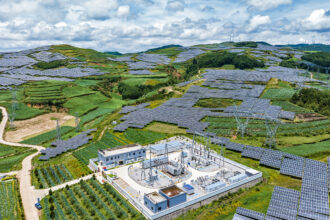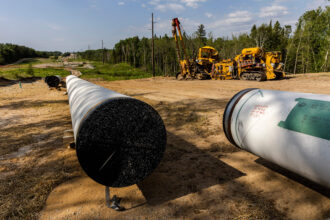House Climate Bill Faces Senate Headwinds (Roll Call)
A breakthrough in the House has given a comprehensive climate bill a jolt of momentum as it heads to markup in the Energy and Commerce Committee today, but it still may not be enough to break the logjam in the Senate.
Thinktanks Seek Funds for Clean Tech in Poor Countries (Guardian)
Members of the Global Climate Network are gathering in London this week to establish a policy to fund action to fight global warming by targeting low-carbon technologies for poor countries.
Biofuels Battle: Bills Push Back Against New Ethanol Rules (Wall Street Journal)
Biofuel defenders are howling about the Obama administration’s new environmental standards, which take into account the “indirect” environmental effects of growing more crops for fuel, and they’re pushing back by proposing bills.
UK Pressed for Inquiry Into Nuclear Plant Construction (Guardian)
The British government is under growing pressure to hold a public inquiry into building new nuclear stations amid claims that the current system of "justification" is fatally flawed.
Contempt of Congress: GOP Reveals Disdain for Clean Energy (Climate Progress)
The GOP’s list of 450 planned amendments to the Waxman-Markey climate bill during the markup this week goes beyond principled opposition to petty politics.
Krugman: Waxman-Markey is Better than Nothing (New York Times)
The environmental community is struggling with how much it’s willing to bend to get legislation that will reduce greenhouse gas emissions. Waxman-Markey is disappointing in some respects, but it’s action we can take now, Paul Krugman writes.
Changes in the Waxman-Markey Climate Bill (NRDC)
The House Energy and Commerce Committee starts a week-long marathon today to pass long-overdue clean energy and climate legislation. Here’s a survey of what’s changed between the 648 page draft and the 932-page bill that was introduced.
As Alaska Glaciers Melt, Land Rises (New York Times)
Relieved of billions of tons of glacial weight, the land has risen so fast around Juneau that the rising seas — a ubiquitous byproduct of global warming — cannot keep pace. As a result, the relative sea level is falling.
EPA clears 42 of 48 Mountaintop Mining Permits (Charleston Gazette)
The Obama administration has cleared more than three-dozen new mountaintop removal permits for issuance by the U.S. Army Corps of Engineers, drawing quick criticism from environmental groups who hoped the new president would halt the practice.
Australia to Build World’s Largest Solar Energy Plant (Reuters)
Australia plans to build the world’s largest solar power station with an output of 1000 megawatts, a $1.4 billion investment, Prime Minister Kevin Rudd announced.
California Plans Polluter Fees (San Diego Union Tribune)
The California Air Resources Board plans to collect more $50 million in annual fees from industries responsible for large amounts of greenhouse gases to recoup the administrative costs of implementing California’s landmark climate change law.
Battery Swaps: Pipe-Dream or Future for Electric Cars? (Financial Times)
Swapping batteries would greatly increase the usability of electric cars, which currently take hours to charge, but the idea raises at least two further challenges.
Universities Generate Electricity in the Gym (AP)
A growing number of college campuses and exercise clubs are retrofitting stationary bikes and elliptical machines to produce watts during workouts.
About This Story
Perhaps you noticed: This story, like all the news we publish, is free to read. That’s because Inside Climate News is a 501c3 nonprofit organization. We do not charge a subscription fee, lock our news behind a paywall, or clutter our website with ads. We make our news on climate and the environment freely available to you and anyone who wants it.
That’s not all. We also share our news for free with scores of other media organizations around the country. Many of them can’t afford to do environmental journalism of their own. We’ve built bureaus from coast to coast to report local stories, collaborate with local newsrooms and co-publish articles so that this vital work is shared as widely as possible.
Two of us launched ICN in 2007. Six years later we earned a Pulitzer Prize for National Reporting, and now we run the oldest and largest dedicated climate newsroom in the nation. We tell the story in all its complexity. We hold polluters accountable. We expose environmental injustice. We debunk misinformation. We scrutinize solutions and inspire action.
Donations from readers like you fund every aspect of what we do. If you don’t already, will you support our ongoing work, our reporting on the biggest crisis facing our planet, and help us reach even more readers in more places?
Please take a moment to make a tax-deductible donation. Every one of them makes a difference.
Thank you,











